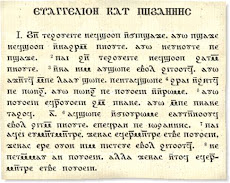The one verse, 2 Thessalonians 2:4, illustrates the three uses of the Sahidic Coptic articles: the Coptic zero article, the Coptic definite article, and the Coptic indefinite article.
This verse also illustrates the correct translation of Coptic John
1:1c.
In the Greek text of 2 Thessalonians 2:4 we have a)theos in the
accusative case; b) theos in the genitive, with the Greek definite article;
and c) anarthrous theos in the nominative.
Correspondingly, in the Sahidic Coptic text we have a) zero-articled
noute, where the Coptic zero-article indicates a general meaning or
characteristic: i.e., "god"; b) definite-articled p.noute, "the god" or "God"; and c) indefinite-articled ou.noute, "a god."
Transliterated, the Sahidic Coptic text reads:
pantikeimenos etjice mmof ejn ouon nim etoumoute eroou je noute houop hwste nfbwk ehoun eprpe mpnoute nfhmoos efouwnh mmof ebol je ounoute pe. (As found in the Sahidic Coptic New Testament by J. Warren Wells, 2006. Occurrences of noute, "god," emphasized by this writer)
Translated into English, the Coptic text of 2 Thessalonians 2:4 says:
"The one who is opposing and raising himself above everyone who is called 'god' or regarded with reverence, so that he goes into the temple of the god and sits down, declaring publicly that he is a god."
Being a careful translation of the Greek text, the Coptic version, properly translated into English, carries the same significance at 2 Thessalonians 2:4 as does the New World Translation and some other careful English versions. Whereas many English versions merely translate "God" wherever theos is found in the Greek text here, these careful versions bring out the grammatical differences:
"He is set in opposition and lifts himself up over everyone who is called 'god' or an object of reverence, so that he sits down in the temple of The God, publicly showing himself to be a god." -- New World Translation
"Who opposes and exalts himself above every so-called god and object of worship, so as to seat himself in the temple of God, claiming that he is a god." -- New American Bible
"He who is in opposition to every so-called god or object of worship, so that he seats himself in God's temple, declaring himself to be a god." -- The Bible in Living English
"He rises in his pride against every god, so called, every object of men's worship, and even takes his seat in the temple of God claiming to be a god himself." -- The New English Bible
What I see here is that careful translators of the Greek text understood the Greek grammar in the same way, and translated 2 Thessalonians 2:4 into their own languages accordingly, from the 2nd century to the present day.
Therefore, in this one verse we see clearly the force of the Coptic zero, definite, and indefinite articles when used with the Coptic noun noute, "god":
ΝΟΥΤЄ (noute) = god
Π.ΝΟΥΤЄ (p.noute) = the god, God
ΟΥ.ΝΟΥΤЄ (ou.noute) = a god
And it is ΟΥ.ΝΟΥΤЄ (ou.noute), "a god" that is found in the Sahidic Coptic version of John 1:1c, in contrast with Π.ΝΟΥΤЄ (p.noute), "God," at John 1:1b.
Tuesday, January 15, 2008
Subscribe to:
Posts (Atom)
